It is Christmas Eve and most people are either at their last morning of work before the holiday break or sensibly at home. I am sitting at my favorite table (unusually, no one else is here to nab it) at the huge picture windows overlooking Swansea Bay. The tide is high (I am told we have the second biggest tides in the world here, surprising for such an unknown little corner) and the small hill below the window is covered in snow. All the white shines the sea a rare blue. The water here is frequently dark and mysterious but rarely displays the lapis and aquamarine hues of postcards. Today we have them, the end of the sunrise faintly pink in the sky above, the sea shining jewel-rich under the low winter sun. I’m not sure the man walking by, rubbing his hands against the cold, is noticing these beauties, his dog trotting behind sinking in her pawprints. A few evergreens remind me that there are other colours in this world than white and blue and I am almost shocked to see the green of the grass patches underneath them, shocked that anything can have escaped the snow.
We have had the sort of snow I have never seen in this country before. Instead of melting almost as soon as it hits the ground, it has lingered and built for a week now, so the landscapes and streetscenes look more what I imagine of Scandinavia or North America (though I believe they clear their streets rather better).
Here is the view from my table at the library a couple of weeks ago, before the snows came. It was about four o’clock in the afternoon and the sun was setting.
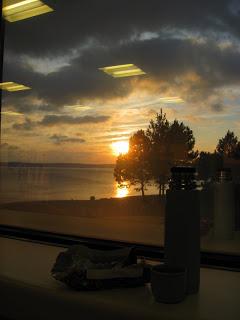
It was strange and difficult coming back to the UK, as I knew it would be. Though of course, knowing something and experiencing it are not the same thing.
I had come back to Europe via Spain (more on that jewel of a county another time) and as I walked around the airport in Madrid, trying to find some sign of my flight as it mysteriously disappeared from all the billboards, a voice rang in my head, over and over:
I am with you. I am with you. I am with you…
I am grateful for the reminder, because what was to come was not easy.
It was good and strange to see old friends in London, in the few days I passed through. I had missed them and miss them still, but, with most of them, witnessing their rush and their worry and their struggle to hold things together in that city… well, I do not miss that.
I came to Wales, to Swansea, Abertawe, to give its Welsh name (which means something like “on the mouth of the river Tawe”), to stay at my grandmother’s house, in a way and for a period of time I have not done in memory. My brother was here too until recently and it was a novelty to me, who has not lived with my family for more than a few weeks here or there since I was fourteen years old. The boxroom I am in is full, the furniture in it full of things that are not mine and the bags and boxes around it largely full of things that are. My clothes are still in suitcases, my papers still in bags, there is not enough floor space for even a very simple yoga practice. Initially I found it very claustrophobic. I walked by the sea, I found the library and with a little time I (mostly) swapped distress for acceptance. There is just enough space on the floor of my room to lay two blocks and kneel and meditate, furniture and boxes and bags brushing me all around. I don’t do this as often as I would like, but I do it.
Swansea is one of those unfortunate towns that was bombed to bits in the Second World War and put back up in fantastically cheap and ugly haste after it. Efforts have been made to beautify it in more recent years, but the town is still nothing to write home about. The countryside around it however is quite special, the Gower coast designated Britain’s first area of outstanding natural beauty some time in the fifties.
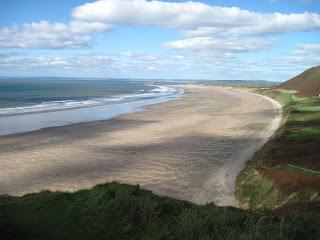
Rhossili Bay
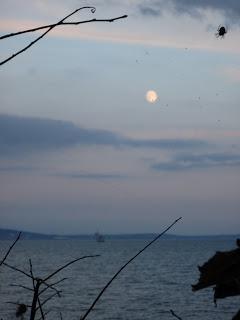
Moonrise over Swansea Bay on an autumn walk
On my walks, I occasionally thought to myself how glad I am that I could not look ahead when I was twenty-two to see where I am now. I don’t know that my fragile optimism would have coped. No home, no relationship, no career – all the things I vaguely assumed would somehow materialise as I grew older. Of course, I am not entirely sure whether I want these things, whether they contradict me, as familiar seeming mutually exclusives tug at me. But I often think it would be nice, comforting to have at least one…
And so I went for more walks, worrying over the fact that “no money” was also in that list and a growing problem.
So I found myself a job. South Wales is beautiful in parts but also one of the poorest parts of the United Kingdom. The news informs me (I am not sure how reliably) that Wales has the highest child poverty rates and lowest educational attainment in the UK. Part of the reason for this is that there is very little work around. Well, you take what you can get and so I took a near minimum-wage temporary job as one of thousands working for an extremely well-known online retailer in its enormous warehouse on the outskirts of Swansea en route to the motorway.
For two months, I entered into an Orwellian universe where every movement was monitored: I was marked by three electronic tags as I came to work and clocked in. Another three marked me as I left. For my first three weeks, my location and rates of work were monitored by my hand-held computer as I “picked” stock, wheeling increasingly heavy trolleys around the ten football pitches that I am told are the size of the warehouse. My shift started at six in the morning and finished at two in the afternoon. In that I got a half hour break (again monitored by all the electronics). We were routinely searched and while this could eat into our break time or delay our home-going, any lateness, extended breaks or absence on our part, for whatever reason, accrued penalty points which would result in disciplinary action.
The work was repetitive, heavy, exhausting and rather dirty, but I was grateful to be physically tired at the end of each day and that it somehow felt more honest than some of the other equally poorly-paid but more white-collar stupid fill-in jobs I have done over the years. At least I was doing something tangible. Someone somewhere was receiving an item because I had dug it out of its box, picked it off its shelf.
It being a proper Orwellian universe, it is full of jargon. For a few days, I thought someone had put a sign high above the IT room as joke. “SNOG IT,” it proclaimed to all us ants below. No one I had come across in IT particularly appealed but sometimes I thought it might be worth a try just to alleviate the boredom. I then realised that the G was in fact a C and SNOC must be yet another incomprehensible acronym. It made me laugh whenever I walked past it, some security guard peering at the cameras, doubtless wondering who the inanely giggling woman is.
I have grown up around Welsh accents and usually have no difficulty understanding them but some of the voices in our “fulfilment centre” (no, not a warehouse because no one is fulfilled in a warehouse – yes our Brave New World has American jargon) were so broad I had to ask them politely to repeat themselves three times before I had the remotest idea what they were saying. So hearing them talk of “totes” and going to find the “team lead” was quite memorable (“Can’t they speak proper fucking English?” was a not infrequent grumble). Possibly my favorite was a sign I saw one day: PACKAGE MANIFEST PENDING. I still have no idea what that means.
I learned to be grateful for small things: that my break was a bit later so the second half of the shift seemed shorter, that sometimes my picking route would take me past the windows. There is something very poignant about the skeleton of a tree against the sky when framed by concrete and seen through a twenty meter high corridor of shelved pallets. That my machine would suddenly order me out of the sweltering, airless tower and to the coolness of the high-corridored racking. I was grateful for the friendliness of my “team lead” who promoted me to “kickouts” in week four, which removed me from the constant computer scrutiny, put me in a slightly more social setting and enabled me to use a little judgment as I followed the (computerised) procedures for dealing with problematic packages that weren’t as they were expected to be. There was less walking but usually more lifting, as I worked in the XL (extra large) section. The shippers on the line would occasionally shout as I struggled with a particularly unwieldy box “Oi Luce! That package is bigger than you are!”
I am beginning to think I should change my name to Luce. So many people call me it anyway and it seems more grown-up and truer to its meaning than Lucy. And of course there’s the French feminist intellectual Luce Irigaray. Lucy seems a name for little girls and old maids… Then again, I have been one of those and I have every chance of also being the other.
One of the shippers decided I must be a great intellectual because I know how to pronounce Montague (a name on one of the shipping labels. I hope Mr. Montague received his parcel in happy ignorance of the two-days of conversation he provoked). The same shipper later asked me what an asparagus is, also “that yellow vegetable which can be big or small” (it turned out to be sweetcorn), confessed he had never eaten a tomato until he was eighteen and to this day only eats three kinds of vegetable (cabbage, sprouts and peas; it felt beyond the call of duty to try explaining that a pea is not a vegetable but a legume). He lives in Port Talbot, which is a peculiar place, characterised by enormous steelworks, great social deprivation and for producing some of the more legendary male British actors (Richard Burton, Anthony Hopkins, and now Michael Sheen is making his way up there). He would give me sweets and bring the heavy boxes over and put them directly on the scales for me so that I wouldn’t have to lift them off the floor. The other shippers stuck a sign to his back one day which said “I love Lucy” but I don’t think he did.
I remarked to my team-lead that many of our colleagues were a testament to the parlous state of British dentistry.
“Put it this way,” he replied. “There are five lads here, if you put them all together, you might have a full set of teeth. You might.”
Another boy (there were definitely boys and men in this place, and far fewer women) I had studiously avoided, although he was friendly enough. I felt rather guilty but he smelt too much of tramp for my nostrils (oh yes, I am so not headed for enlightenment any lifetime soon). Around the Montague time, names were a theme and I spotted an incomprehensibly spelt Welsh one even more incomprehensibly on its way to London. Mr. Odour, boyishly keen to prove himself, turned out to be the only Welsh-speaker amongst us and delivered the name in bewitchingly flowing tones. I was quite stunned to discover such music amongst the dirt and boxes and stench and deeply regretted my olfactory compulsion to avoid his offers to improve my Welsh. He spent the rest of the day picking fights with people and was banished to another part of the unfulfilment center.
But really what I re-discovered amongst these people I would never normally meet is that the world is a fundamentally kind place. At least, my world is a fundamentally kind place, full of fundamentally kind people (and the occasional wanker), from the stranger I meet by the boxes offering me the sort of sweet I would normally avoid like the plague before seven in the morning, to the chat with the old coal-miner who’s looking for a job that will take him through the next ten years. And I have this sort of conversation, a sort I very rarely have:
A packer comes to my kickout station with a problem order. The weather has been very bad and most people are snowed or iced in. He tells me about his journey to work.
“I come from Llanelli,” he says. “I live on the Felinfoel Road” (that’s VELINVOLE – long Welsh O at the end – for anyone unfamiliar with Welsh pronunciation. I’m not even going to try with Llanelli).
“Really?” I say. “My aunt and uncle lived there…” which is not the sort of thing I usually say anywhere.
“What number?” he asks, and so it goes until we resolve his order problem.
In general, these blue-collar registers and cadences are familiar to me, familiar but unusual, because I only hear them from my grandmother and her brothers and sister. It’s the first time I make this connection and I am careful not to tell her. I don’t know what I make of having both so much and so little in common with the people with whom I work.
“What’s that voice? That’s not from around here,” men say to me.
Another giver of sweets, a forklift truck driver, shouts over to me one day:
“Are you on Strictly Come Dancing?”
“No.”
“What sort of dancing do you do?”
Well, how do you answer a question like that? These days, I go for as briefly as possible. “Contemporary. You won’t see that on Strictly. Ever.”
An occasional curiosity about my dancing has arisen because a few people know that I am off to Massachusetts to take part in Nancy Stark Smith’s workshop at Earthdance in January (though I generally stop after the Massachusetts bit). All the snow and ice is giving me a chance to road-test my thermals before I throw them at a North American winter (last time I was in western Massachusetts in January, the temperature plummeted to -29). The thought of going is what is keeping me sane. “Anithya, anithya, anithya”, I keep hearing Goenka’s voice droning in my head on my solitary walks. It’s interesting how much my sweaty time in Cambodian Vipassana boot-camp comes back to me here. I can’t even remember exactly what it means, just generally that everything is temporary. “This too will pass”, I’ve kept remembering – as too will the time in Massachusetts, and savings on minimum wage jobs being what they are, I may well be back to it come February.
With the snow being so heavy, many pre-Christmas orders have been cancelled and there are pallets and pallets of parcels waiting for the lorries to collect them. Work was grinding to an uncomfortable halt. My pre-dawn journeys had morphed into a crash-course in arctic driving, but despite being one of the few who made it in every day of bad weather, my services were no longer required and on Monday I was let go a day and a half early. Well, I could have done with the money, but it’s also nice to have some time – though that’s being swallowed up by the monster that is the pre-Christmas panic.
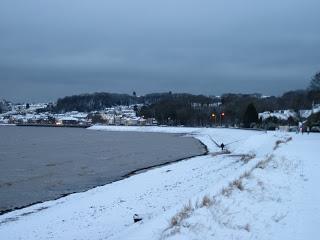
Mumbles under snow
Early in my stay here, on a beautiful autumn day, my brother and I took my grandmother into Ceredigion, near the coast in west Wales. We went to a Nash estate called Llanerchaeron (good luck pronouncing that one) where Nana’s grandfather had been head gardener in the 1930s. On the drive out, we stopped at the cottage where she and her sister had stayed with their grandparents as children. It struck me that this is the closest I’ve seen to anything resembling the ideal home of my imaginings, with its remoteness, quaint local windows and the river Aeron running its last couple of miles to the Irish Sea through the back garden. Now it’s a very pricey National Trust holiday cottage, complete with satellite dish hidden in the bushes. I suspect it was rather less comfortable in the days my great-great-grandparents lived there, when there was no electricity, what heating there was came from the fire and my great-great-grandfather would carry the household drinking, cooking and washing water home with him as he walked the four miles from the main house every day. (I couldn’t quite understand why they didn’t just get the water from the river. Perhaps it wasn’t safe…)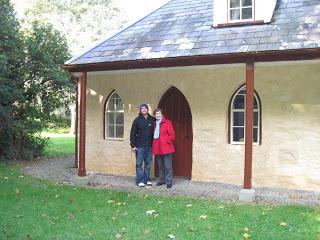
Nana and Nino in front of the cottage
In some ways, I feel I am still in the state I was when I was traveling. That is something I am grateful for. Not always, but often, things seem less oppressive, less of a sentence I can’t escape, because I know they are temporary. I am just passing through, I am just passing through. Again and again the image has come to me that was a constant companion on my travels: of my feet walking and leaving no prints, the image of passing through this earth, passing over this earth and leaving no trace. Instead of frightening me now, it comforts me.
I got my sleeping bag out a few days ago, as I began to gather the things I will need for my next trip. (A month seems a very short time now.) A fierce relief gripped me as I held my sleeping bag, a sense of coming home, being myself once again. I drove out into west Wales two days ago, achingly beautiful in silent snow. Part of me longs for a house, fiercely longs for a house in quiet and space, with a fire, a reading and writing room, a dance/yoga studio, a kitchen, maybe a dog, remote, surrounded by fields and hills and trees and not too far from the sea. Another part of me equally fiercely knows itself at home when I am on the move and is relieved at the order, the simplicity of condensing my life to a suitcase, a rucksack, something very portable.
As I cannot afford much of either at the moment, I should be grateful that this is not a choice I have to make. But I am not quite.
I am not sure if it’s the effect of my travels, the meditation boot-camps or just encroaching middle age but I feel myself better at accepting what comes to me. Yes, I still find it difficult, I still get frustrated but monotony doesn’t reduce me to the neurotic and miserable wreck it once did. Perhaps it is my increasingly conscious experience of impermanence, of change. I have felt far more isolated over the last few months than I was at any point in my wanderings. The two or three times I have had contact with friends who know or care anything of what I do and love and am, I have flooded them with a torrent of verbal diarrhoea, an untrammelled outpouring of recognition and relief. But the isolation too is alright, if a bit sad at times.
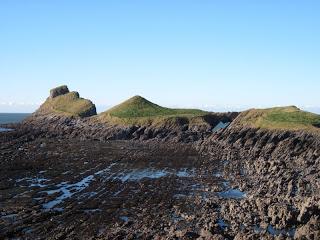
Wyrm's Head, Rhossili
What makes it alright is the landscape around me. I remember my friend Barbara coming back from a hike up the mountain in Dharamsala and saying to me it was so beautiful she felt like she was looking at the face of God. Through the windows of the industrial warehouses, above the traffic on the road that borders the sea, on my walks, against the ugliest of Swansea’s ugly buildings, I have found the changes in the sky a bewitching comfort. I can see the skies here as I never could in London and somewhat to my surprise, I have found myself falling in love with these landscapes, these skyscapes. The dreary gray British weather that so depresses me has been conspicuous by its absence. I was welcomed with a bright golden autumn that transformed into a bright white winter. I have loved the snow and ice, the quiet of it, the light of it, the joy of children skidding on the plastic toboggans which have emerged from seemingly nowhere, watching adults pulling everything from their shopping to their toddlers along on the ice behind them. I have been lucky in that I have been able to get out and about in it. It’s as though the land has conspired to woo me out of my hostility to British weather, to British vistas. Again and again I have seen the face of God as the clouds move over changing skies, in the seal pup that looked up at me from his rock, and in the silence of snow-bound fields. Again and again it has comforted me.I am with you. I am with you. I am with you…
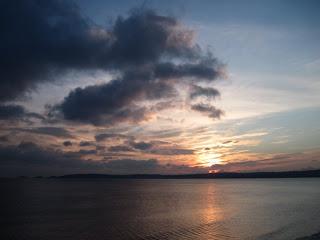
From Lucy with love. x

